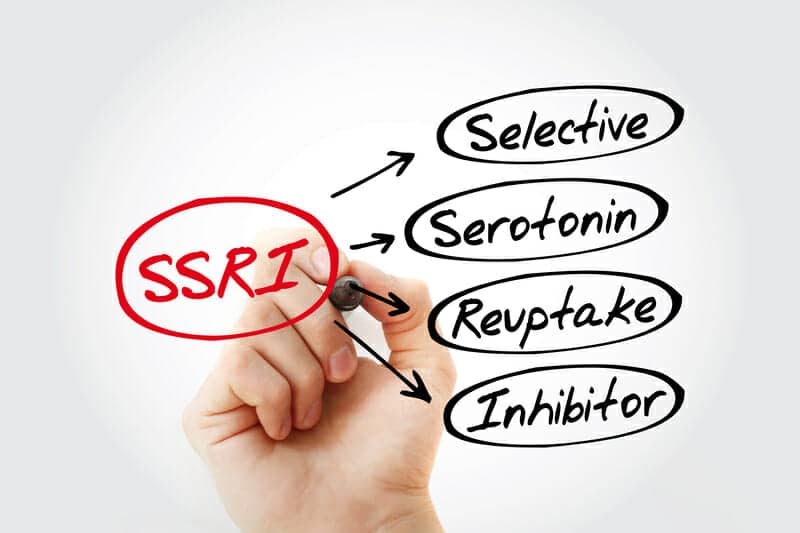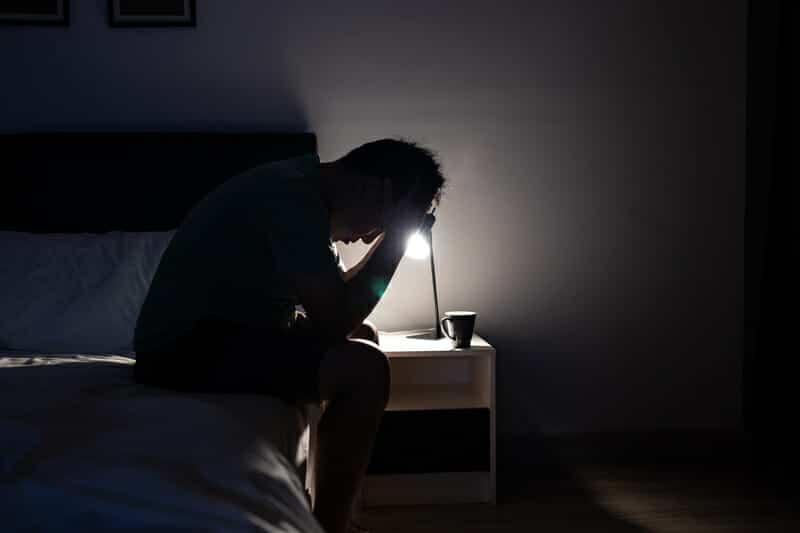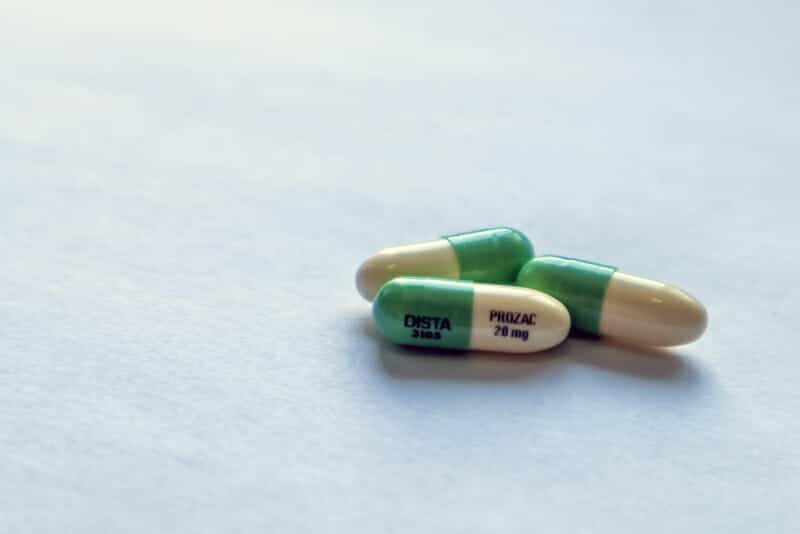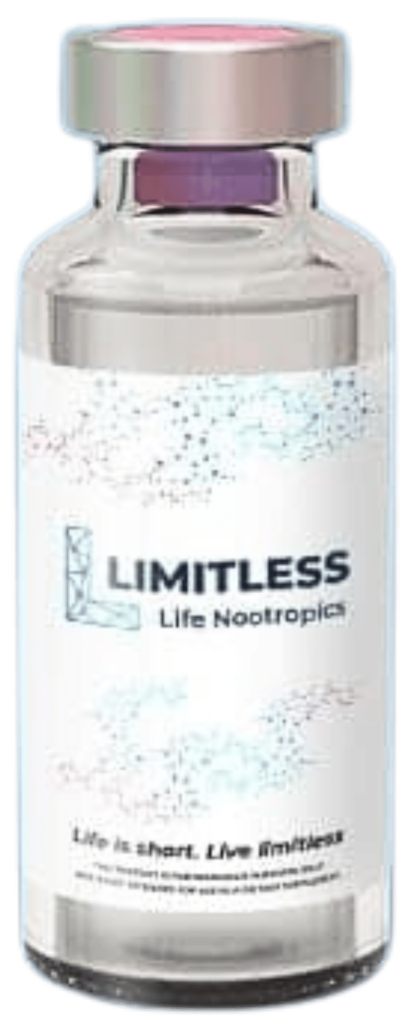Talk to anybody about antidepressants and you’ll see some staggering numbers:
- “During 2015–2018, 13.2% of adults aged 18 and over used antidepressant medications in the past 30 days. Use was higher among women (17.7%) than men (8.4%).”
- “Antidepressant use increased with age, overall and in both sexes—use was highest among women aged 60 and over (24.3%).”
And we are currently at an all-time high use of antidepressants due to the debilitating conditions brought about by the ongoing lockdowns.
Drugs such as selective serotonin reuptake inhibitors (SSRIs) seem to be the catch-all solution for treating depression… except when it ruins your sex life.
Driving you into a deeper state of depression, which then requires continued use of SSRIs, and on and on the cycle goes.
What I want to show you is why you need to get off using SSRIs immediately if you care about your bedroom performance.
And if you’re considering the use of SSRIs, this article will change your mind for good.
Table of Contents
ToggleWhat are SSRIs and How Do They Work?

Selective serotonin reuptake inhibitors (SSRIs) are a type of antidepressant medication that affects the availability of the neurotransmitter known as serotonin (5-HT, 5-hydroxytryptophan).
You’ve probably heard or used one of them before — drugs like Zoloft (sertraline), Celexa (citalopram), and Prozac (fluoxetine) are popular examples.
These drugs work entirely around the basis of the “serotonin hypothesis”:
“Through its widespread distribution within the neural axis, serotonin is thought to play a key role in the modulation of excessive stimuli of a wide variety and in the organization of appropriate responses. It has been suggested that the overall function of the serotoninergic system is to enable the organism toward of feelings of fear, helplessness and depression. Consistent with this hypothesis is the evidence that alterations in serotonin activity have a role in core behaviors which are also disturbed in affective illness.”
In its simplest form, the serotinin deficiency theory of depression postulates that there is a net reduction in serotonin transmission in depressive illness”
Or put another way:
“SSRIs increase the serotonin level in the brain by preventing it’s reuptake by the presynaptic neurons, meaning the hormone instead remains available to bind to postsynaptic neurons and exert its mood enhancing effects”
If you want to dive deeper into the mechanism of action behind SSRIs, the YouTube video below is helpful:
Otherwise, it’s not important for you to have a Ph.D. in neurochemistry to understand what’s going on.
What IS important is they are the most prescribed class of antidepressants among all the other ones to exist.
And for two main reasons: A wider application towards other mental health conditions, and fewer side effects than other types of antidepressants.
Notably, SSRIs take 4-6 weeks — or longer — before a clear reduction in depressive symptoms can be felt:
“SSRIs don’t target the serotonin transporter directly. Although some SSRIs (for instance, Lexapro) bind directly to the transporter, the direct binding is not the underlying mechanism of action. Instead antidepressants target our DNA, in particular the genes that code for the serotonin transporter. They make these genes less active, so fewer serotonin transporter molecules are available in the brain. This, it is argued, explains the delayed action of antidepressants.
Since our brain has plenty of active serotonin transporter molecules when we start taking antidepressants, it takes a while before a suppression of the genes that code for the transporter has an effect on serotonin in the brain”
Yet the fact that SSRIs are “better” than other antidepressants doesn’t automatically make them the best solution for treating depression.
Because you’re about to see why depressed people are put in a hard spot with SSRIs: You either give up your sex life or you give up the possibility of fixing your depressive symptoms.
Can SSRIs Lower Testosterone and Cause Sexual Dysfunction?

Before we get into the evidence showing clear reductions in sexual health connected to SSRI use, let’s examine how SSRIs can make a healthy man (or woman) lose their sexual drive.
First, we have to understand what happens when serotonin production is artificially increased:
“DA [dopamine] enhances, whereas 5-HT inhibits, sexual motivation and performance and thus may contribute to initiation and satiety, respectively.
Dopamine has enabling effects on sexual motivation, copulatory competence, and genital reflexes. Dopamine in the nigrostriatal pathway influences motor activity and in the mesolimbic pathway it activates various motivational behaviors, including sexual activity. In the medial preoptic area (MPOA) it controls genital reflexes, sexual configurations, and specifically libido.
Serotonin generally inhibits sexual activity. Sexual behavior is impaired by many 5-HT agonists and agents that increase 5-HT. Serotonin (5-HT) is primarily inhibitory, although stimulation of 5- HT2C receptors increases erections and inhibits ejaculation, whereas stimulation of 5-HT1A receptors has the opposite effects like facilitation of ejaculation and, in some circumstances, inhibition of erection.”
And expanding further on how specifically serotonin impacts sexual performance:
“The specific effects of serotonin on the sexual experience may result from signaling through specific subtypes of 5HT receptors. Relevant to the pharmacology of antidepressant agents, it is thought that stimulation of 5HT2A receptors has negative effects on sexual function. Stimulating 5HT pathways in the raphe nuclei, which project down the spine as well as into the brain, are hypothesized to negatively influence the three stages of the sexual experience [interest and desire (libido), physiologic arousal, orgasm]”
While the explanation for serotonin is obvious, the effect of dopamine on sexual performance raises an interesting point: Do SSRIs simultaneously inhibit dopamine production and/or availability?
Some evidence suggests it does while other research suggests the opposite, yet there’s enough data to put dopamine inhibition forth as a possibility.
Another possible mechanism of action in SSRI-induced sexual dysfunction involves nitric oxide:
“Nitric oxide plays an important role in mediating the penile vasculature changes essential for erection and also is hypothesized to promote penile smooth muscle relaxation
via cyclic guanosine monophosphate, thereby contributing to physiologic erection.Paroxetine is known to inhibit nitric oxide synthase, which reduces nitric oxide levels… it is hypothesized that 3 nitric oxide synthase isoenzymes are structurally similar to cytochrome P450 (CYP450). Paroxetine is a strong CYP2D6 inhibitor, which contributes to low nitric oxide levels in patients taking the drug”
Add in lowered “arousal mechanisms in genital organs” through vasocongestion suspension (Source), and you have a potent sex-killing drug in your hands.
(FYI – vasocongestion is defined as “swelling of genital tissues caused by increased vascular blood flow and a localized increase in blood pressure during sexual arousal”)
Yet the extent of the damage doesn’t just stop with altering your neurochemistry.
Even at the hormonal level, we have viable mechanisms of action that show how SSRIs can:
- Lead to abnormal sperm DNA fragmentation
- Decrease sperm concentration and motility
- Lower your testosterone levels (here, here, and here) AND affect your estrogen levels
- Result in systemic endocrine disruption
So far, the betting odds are not looking good for SSRIs.
I highly recommend watching the two YouTube videos below to see the inner workings of how SSRIs impact your ability to have sex:
Research on SSRIs and Sexual Dysfunction

As sad as it is to say, doctors have been made well-aware of SSRIs and their destructive impact on one’s sex life since the 1980s:
“The effect of antidepressants on sex was first noted in 1960 by Frank Ayd, a psychiatrist and the discoverer of amitriptyline, who linked amitriptyline treatment to a sexual dysfunction distinct from the loss of libido that the melancholic states it was being used to treat can cause.”
“…In the 1980s, prior to marketing, healthy volunteers in phase 1 studies of SSRIs, however, had become dependent on SSRIs and were left anxious and depressed afterwards. Within three years of paroxetine being on the market, there were more reports in Britain about dependence on it than there had been in 20 years from all benzodiazepines combined.
The initial labels for all SSRIs when these drugs were launched clinically stated that less than 5% of patients in clinical trials reported sexual dysfunction. But in some unpublished phase 1 trials, over 50% of healthy volunteers had severe sexual dysfunction that in some cases lasted after treatment stopped.”
This side effect takes place in SSRIs at a much higher frequency than antidepressants that target depression through a different biological mechanism of action.
But just how often does sexual dysfunction take place in people who are using SSRIs?
According to several studies, it’s high enough that people EXPECT to suffer sexual side effects if they are taking them:
“In an investigation on examining patients with major depressive disorder, eighty-five percent of patients scored the management of sexual dysfunction as “extremely important,” “very important,” or “important. In fact, SSRIs may negatively influence all dimensions of the sexual response cycle, leading to a decrease in libido, the disturbing situation of arousal, erectile dysfunction and, absent or retarded orgasm”
“In a review, it has been reported that that forty percent of patients who were ongoing antidepressant medication had any type of sexual side effect. In a study, the sexual side effect rate of people who used imipramine was found to be 30%.This rate was reported to be 25% to 73% for patients who were taking an SSRI.”
“It seems that the rate of sexual side effects is so high, but, the exact prevalence rate is not known exactly. Some studies reported up to 80% of SSRI-induced sexual side effects.”
For this reason, people will often opt for non-SSRI antidepressants such as Buproprion (Wellbutrin) to decrease the chances of experiencing sexual dysfunction via increased dopamine production, anxiety medications such as Buspirone, or use Viagra to overcome the damage done by SSRIs.
(Of course, all of this assumes there aren’t co-morbidities such as diabetes contributing to poor sexual performance).
Yet this is a temporary cover-up of a much larger problem.
If you look carefully at how pharmaceutical companies “evaluate” sexual dysfunction, you’ll notice the trials are rigged to hide the prevalence of sex-related side effects:
“Almost all double-blind, placebo-controlled drug trials of antidepressants are performed by pharmaceutical companies.
They often compare their product with a competitive drug already present in the market. If sexual side effect incidence is an important factor in the future marketing of the drug, the pharmaceutical company often uses a competing antidepressant with a known, high propensity to induce sexual side effects.
Although this may lead to the suggestion of a lower propensity to induce such effects, in later clinical practice realistic data are materialized and often lead to a different profile. Many more serious issues cloud the interpretations of many studies into the sexual side effects of antidepressants”
But in all fairness, a good portion of the blame can be attributed to patients who do not disclose diminished sexual performance unless specifically asked:
“Initial SSRI registration studies found that such side effects were reported by fewer than 10% of patients. When doctors specifically asked about treatment-emergent sexual difficulties, some found that they were present in up to 70% of patients”
It’s even comical to consider that the effect of SSRIs on your performance in bed starts happening immediately after taking them:
“Close to 100% of takers of a selective serotonin reuptake inhibitor (SSRI) have a degree of genital sensory change within 30 min of taking. These effects consist primarily of a reduced sensitivity, often termed ‘numbing’ by those affected but others have genital arousal (irritability). The reduced sensitivity is accompanied by an immediate delay of ejaculation in men and muting of orgasm in both men and women. After a period of treatment, orgasm may stop and there may be a loss of libido.
The ‘numbing’ effect produced by SSRIs has similarities to the effect of rubbing lidocaine into the genital area, which was a prior treatment for premature ejaculation, and SSRIs in single doses are used for premature ejaculation now”
Unfortunately, as you’re going to see in the next section, sometimes stopping the use of SSRIs just isn’t enough…
The Rise Of PSSD (Post SSRI Sexual Dysfunction)

I recently wrote about Post-Finasteride Syndrome (PFS) and how some men using hair loss drugs may experience long-lasting reductions in sexual function, even when they’ve stopped using said drugs for several months and/or years.
As it turns out, the same phenomenon exists with the use of SSRIs and it was first categorized as “PSSD” back in 1991.
The sad truth is that this possibility does not get fully disclosed to patients and they learn about it AFTER the fact:
“[Patients] are almost universally told that their sexuality will return to normal after tapering off the drug. Unfortunately, recent data has emerged showing that this is not always true. Some patients continue to experience sexual dysfunction for weeks, months, or years after withdrawing from such treatment. Sometimes, these symptoms only emerge after the patient has tapered off the medication.”
“Even more alarming are the patients coming forward who have experienced a total elimination of their sexuality that persists indefinitely. These patients report a severe or total loss of erotic sensation in their genitals, sometimes to the point of tactile numbness. Some patients have been unable to experience attraction, arousal, or orgasm for years or even decades, with no other discernable cause apart from treatment with antidepressants.”
We can easily attribute this effect to the drug alone as several case reports were able to rule out other causes of sexual dysfunction such as diabetes, elevated prolactin levels, and low testosterone levels.
Diving deeper, we can see that sexual performance is destroyed across every aspect imaginable:
“…the most frequently-reported symptoms of PSSD are low sex drive, loss of sensation in the genitals and nipples, erectile dysfunction, poor orgasms, premature ejaculation, and vaginal dryness. For some patients, symptoms began shortly after taking their first SSRI dose. Others started having symptoms over the following days or weeks.”
To this day, we still don’t know its exact mechanism and several theories have been put forth:
“Different theories have been proposed to explain the pathophysiology of PSSD: epigenetic gene expression theory, cytochrome actions, dopamine-serotonin interactions, proopiomelanocortin and melanocortin effects, serotonin neurotoxicity, downregulation of 5-hydroxytryptamine receptor 1A, and hormonal changes in the central and peripheral nervous systems.”
(Fun fact: While men suffer PSSD at a higher frequency, women suffer PSSD more severely)
We also do not have a cure or therapeutic treatment strategy for PSSD, so addressing this condition is a lot like an “art” where you throw some darts and hope something hits the bull’s eye.
There are even dangers associated with quitting SSRI use “cold turkey”, which is another complicated variable doctors have to navigate their way around.
And while some supplements show promise, nothing is guaranteed.
Again, similar to PFS, the ideal course of action would be a genetic screening test to predict which patients should stay away from SSRI use altogether.
Because just like the hair loss drugs, patients respond in numerous ways and some people just won’t notice any difference in their sex lives.
Are There Better Ways to Treat Depression?

It is beyond evident that throwing pills at the problem of depression is both ineffective and quite possibly dangerous.
Additionally, drug-based strategies such as having intercourse before using the pill, lowering the dose, or using another medication are just ways to avoid addressing the root problem.
However, the solution isn’t to merely give up and “accept” depression as the norm.
Nor should we be giving these drugs to developing teenagers!
Due to the incredibly complex nature of depression, a multi-faceted approach is required:
“[The biopsychosocial] model suggests that biological, psychological and social factors are all linked together and important with regard to promoting health or causing disease.
In other words, the mind and the body are not independent and separate things as was previously thought.
Instead, they are connected and dependent on each other. What affects the body will often affect the mind and what affects the mind will also often end up affecting the body“

(Source)
Yet I firmly believe the solutions are found on the “fringe” — the outskirts of medical practice where most doctors simply won’t explore or acknowledge.
So with all of this said, here are some starting points I would recommend for any aging man (and woman) suffering from depression.
Fully Optimize Your Hormonal Health
This is a prescription, not a suggestion.
I’ve written multiple times on my blog how low testosterone can negatively impact mood and overall mental well-being, and so have several hormone optimization physicians.
And I have compiled numerous studies in The TOT Bible on the connection between higher rates of depression and suboptimal testosterone levels.
Not to mention the book comes with a comprehensive panel of biomarkers to track and the optimal ranges you should be within.
You owe it to yourself to get your hormone levels checked by a qualified physician who can then diagnose you as hypogonadal (i.e. not naturally producing enough testosterone).
Because if this is the case, therapeutic testosterone may be able to reverse some of the damage caused by SSRIs.
In the WORST POSSIBLE scenario, you will definitively rule out a major cause of depression for men worldwide and can explore other treatment routes.
Services such as LetsGetChecked or HoneHealth (formerly Peak) will allow you to do this from the comfort of your own home, so no more excuses about the “pandemic”!
Don’t forget about the importance of other lifestyle activities such as losing body fat, lifting weights intelligently, managing stress, sleeping 7-8 hours a night, and eating whole nutritious foods.
Which leads me to the next point…
Get Your Blood Work Done Once Every 3-6 Months
As much as the “what gets measured gets managed and gets improved” quote is repeated ad naseum in business and life, the axiom has surpassed time because of its inherent truth.
Make sure you are measuring your inflammatory markers and anti-aging markers to ensure every fact of your health is running smoothly.
You might even find vitamin and mineral deficiencies to be playing a significant role in your depression.
But thanks to advancements in science, there are specific biomarkers doctors can use to identify unexplored root causes of depression.
Some tests currently in development can even predict how well you will respond to certain antidepressant treatments:
“The blood test, described in the International Journal of Neuropsychopharmacology, is the culmination of years of investigation.
It looks for two specific markers of inflammation – a compound called macrophage migration inhibitory factor (MIF) and another called interleukin-1beta.
In the study, patients with high levels of these markers were unlikely to respond to conventional, commonly prescribed SSRI and tricyclic antidepressants.
… inflammation is the body’s response to stress, but, paradoxically, it gets in the way of drug treatment. High levels of inflammation can interfere with the same biological processes that are crucial for antidepressants to work.”
I’m not endorsing the use of antidepressant drugs, yet many researchers are getting closer to “quantifying” depression.
Explore Therapeutic Peptides Designed to Improve Cognitive Health
I am fully transparent in the promotion of peptide medicine to treat common lifestyle diseases and disorders.
And I make no exception to this rule when it comes to your brain: You only get one in this lifetime and you may as well ensure it is firing on all cylinders at all times.
I’ve written about many of them (and more coming), including:
- Selank for generalized anxiety disorder
- Semax for neuroregeneration
- Cerebrolysin for neuroprotection
- Dihexa for cognitive repairment
- PE-22-28 for major depressive disorder
But given the clear suppression of these peptides, you’ll have to be smart in sourcing them.
That’s why my sole recommendation is to use Limitless Life Nootropics as your go-to vendor and get 15% off your purchase with code JAY15.
Heal Unintegrated Trauma And Shame By Raising Your Vibration
I’ve written about the importance of spiritual health in both The TOT Bible (Chapter 16) and Living A Fully Optimized Life (Chapter 9).
As of the past few years, I have transitioned away from being the “testosterone bro” towards a being of light and love.
I AM now the #RaiseYourVibrationtoOscillation bro and damned proud of it.
My website is overwhelmed with podcasts and articles on the importance of spirituality.
Modalities such as RASHA, 5-Meo-DMT, and plant medicine can be useful in conjunction with practices such as meditation, visualization, and manifestation.
I also work with amazing Trauma Therapists like Rebecca Taylor Shaw and Terrina Picarello who can heal your current and past lifetime traumas in short order.
And contrary to what you may believe, there is emerging evidence which shows this is not a “woo-woo” idea:
“In summary, this study surveyed an urban population and found that higher spirituality scores correlated with fewer depressive symptoms. In particular, belief in a higher power, having a relationship with a higher power, and belief in prayer showed significant difference between depressed and non-depressed individuals.
Finding patient-sensitive ways to encourage patients’ intrinsic belief system may benefit their depressive symptoms. Further, understanding a patient’s spiritual life, and its impact on mental health, gives care providers insight into a significant coping mechanism”
Get your mind right, get your body right, get your soul right, and you can make depression a thing of the past.
As always…
Raise Your Vibration To Optimize Your Love Creation!
PS. Within 6 weeks my courses on Hormone Optimization and Peptides will be into the ether.
Both courses will help transform the world leading us into the Golden Age.



